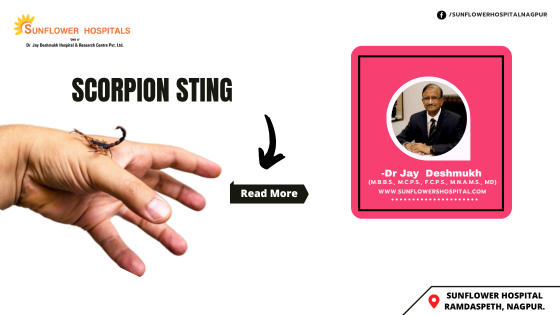How do scorpions bite humans?
Scorpions would rather escape humans than attack them, and the stings are usually unintentional. Scorpions may hide in crevices of stone houses, roofing, bedding, clothing, and footwear. Stings occur in humans when they dress, get into bed, or when they lean or sit on the walls. Scorpions may fall from the ceilings of thatched roofs into sleeping victims below.
What are the common local symptoms of scorpion stings?
At the site of the sting, there could be pain that may become intense and associated with numbness and tingling sensation, slight swelling and warmth. This may come all of a sudden.
Can a victim have serious symptoms?
This is more common in children and the elderly. This is due to the venom effects. This includes higher heart rates, sweating, nausea, vomiting, high blood pressure, difficulty in breathing, muscle twitching, unusual head and neck movements, or even paralysis. Individuals who have a second sting after a first sting a few months or years earlier suffer the most. They may have severe symptoms due to previous sensitization.
What is the primary treatment?
Clean the wound with soap and water. Apply cool compression to the affected area. This helps to reduce pain. If there is breathing difficulty, avoid water and food. Paracetamol or Ibuprofen may be given to reduce pain at the site of the sting. Observation for clinical deterioration at least for one day is recommended. Children and the elderly need special attention. Tetanus vaccine may be given after checking the vaccination history of the individual. What is done in almost too scorpion species are found in India. Most serious conditions are caused by the red scorpion known as Hottentotta. Stings often occur on the toes and fingertips. The 30% fatality rate reported in thei970s is reduced now to 3%. This is due to better access to treatment and antihypertensive treatment, though 3000 deaths are reported every year.
What is done in the hospital?
Some individuals have severe cardiovascular illness in terms of very high or very low blood pressure and high pulse rate and congestion in the lungs. Some may have excessive sweating or severe muscle twitches. Some have impaired blood clotting, and a few may even have acute kidney failure or even paralysis. Individuals are monitored for likely effects and complications due to the scorpion sting and may require oxygen, ventilatory support, or even dialysis. Anti-scorpion venom antibodies produced at Half-kine Institute, Mumbai are administered in most cases. Excess adrenaline and nor-adrenaline effects are treated by Terazosin, a commonly used Blood Pressure reducing drug.
What is the composition of scorpion venom?
It contains different compounds of varying compositions. The compounds consist of neurotoxins, cardiotoxins, nephron toxins, hemolytic toxins, phosphodiester-terraces, histamine, and serotonin. The most important is the neurotoxin.
What are the complications of scorpion sting?
The very young and the very old are likely to die after an untreated venomous scorpion sting. The cause is usually heart or respiratory failure occurring some hours after the sting. Another complication is severe allergic reactions or anaphylaxis.
Is the scorpion anti-venom expensive?
1 ml of the drug costs about Z 500, and thus is affordable. It needs to be diluted and given intravenously slowly. One needs to be aware of possible allergic reactions. Always shake out your travel gear, boots, gloves, and clothing if they are not used for a while before use. Keep your environment as clean as possible. Do not apply ice or a tourniquet at the sting site. Keep the individual under medical surveillance at least for one day. Young children and the elderly are at greatest risk.
Author: Dr Jay Deshmukh
Dr Jay Deshmukh is Chief Physician and Director, Sunflower Hospital, Nagpur Honorary Physician to Honorable Governor of Maharashtra and PondicherryCentral. Dr Jay Deshmukh is an M.B.B.S., M.C.P.S., F.C.P.S., M.N.A.M.S., MD From Internal Medicine – Bombay and New Delhi.


